#ivor gurney
Text
To His Love
He's gone, and all our plans
Are useless indeed.
We'll walk no more on Cotswold
Where the sheep feed
Quietly and take no heed.
His body that was so quick
Is not as you
Knew it, on Severn river
Under the blue
Driving our small boat through.
You would not know him now…
But still he died
Nobly, so cover him over
With violets of pride
Purple from Severn side.
Cover him, cover him soon!
And with thick-set
Masses of memoried flowers—
Hide that red wet
Thing I must somehow forget.
— Ivor Gurney, 1917.
#ivor gurney#poetry#poem#war poetry#literature#gay literature#lgbt literature#gay#mlm#lgbt#world war i#world war 1#wwi#ww1#1910s
9 notes
·
View notes
Text
youtube
Ivor Gurney (1890-1937) - Ludlow and Teme: No. 2, Far in a Western Brookland
Artist: Charles Daniels
Artist: Michael Dussek
Ensemble: Bridge String Quartet
5 notes
·
View notes
Text
A poem by Ivor Gurney

After-Glow
(To F. W. Harvey)
Out of the smoke and dust of the little room
With tea-talk loud and laughter of happy boys,
I passed into the dusk. Suddenly the noise
Ceased with a shock, left me alone in the gloom,
To wonder at the miracle hanging high
Tangled in twigs, the silver crescent clear.
Time passed from mind. Time died; and then we were
Once more at home together, you and I.
The elms with arms of love wrapped us in shade
Who watched the ecstatic west with one desire,
One soul uprapt; and still another fire
Consumed us, and our joy yet greater made:
That Bach should sing for us, mix us in one
The joy of firelight and the sunken sun.

Ivor Gurney
(1890-1937)
2 notes
·
View notes
Text


by gerald finzi and ivor gurney | gloucester cathedral
17 notes
·
View notes
Text

Need to sing this IMMEDIATELY. Like actually. I’m gonna ask my voice professor
#or anything from this song cycle but DAMN#this arrangement is actually so gorgeous#and would suit my voice I think…? :3#there are so many good lesbian Lieder. good for them! go lesbians!#also will definitely find a way to use this for my evil fanfic purposes <3#it’s night/moon/silver symbolism. that’s the whole thing#musicposting
2 notes
·
View notes
Text
I was looking for something on my docs and found the transcripts I think that's the right word idk that I wrote for Ivor Gurney's letters (he was a composer and a poet and fought in world war one) to use in my dissertation and it has been nearly two years since I last read these letters and I have never been reduced to tears so quickly. Oh this man ☹️
2 notes
·
View notes
Photo
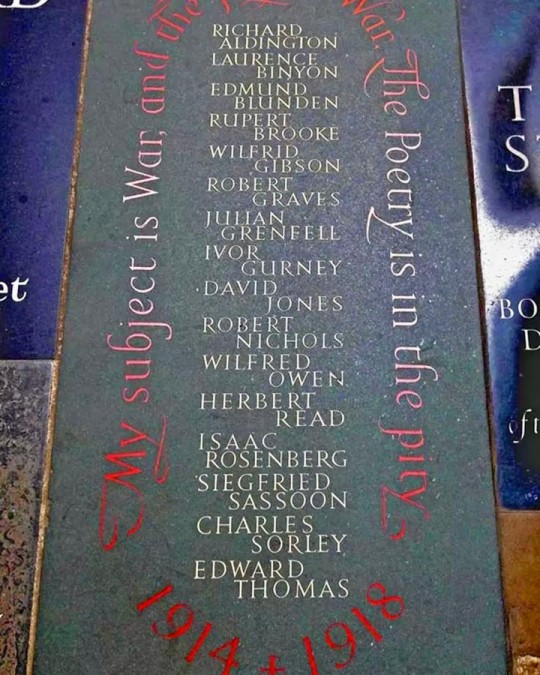
Poets of the First World War Sixteen poets of the Great War (World War I) are remembered on this memorial: - Richard Aldington (1892-1962) - Laurence Binyon (1869-1943) - Edmund Blunden (1896-1974) - Rupert Brooke (1887-1915) - Wilfred Gibson (1878-1962) - Robert Graves (1895-1985) - Julian Grenfell (1888-1915) - Ivor Gurney (1890-1937) - David Jones (1895-1974) - Robert Nichols (1893-1944) - Wilfred Owen (1893-1918) - Sir Herbert Read (1893-1968) - Isaac Rosenberg (1890-1918) - Siegfried Sassoon (1886-1967) - Charles Sorley (1895-1915) - Edward Thomas (1878-1917) None of the poets are actually buried in the Abbey. The stone is of Westmoreland slate, cut by Harry Meadows. The inscription in red lettering around the names reads: My subject is War, and the pity of War. The Poetry is in the pity The date "1914+1918" appears at the base. The idea for this memorial came from the Dean of Westminster, Edward Carpenter, who initially thought that five or seven poets could be chosen to represent all the poets of the Great War. He consulted with eminent historians and authors to ask for their suggestions. From those suggestions a final list of sixteen representative poets was drawn up and funding was obtained. https://www.instagram.com/p/Cd_QajfLPr-/?igshid=NGJjMDIxMWI=
2 notes
·
View notes
Text
0 notes
Text
was listening to lieder on spotify (shoutout ethel smyth 🗣️) and THIS AUTOPLAYED OH MY GOD?
#i have to listen to them all now#and probably title a chapter after one#even though ive already used too many mezzo/sop pieces#im supposed to be using baritone pieces dammit 💔#its okay i love lesbians. lets go lesbians lets go
0 notes
Text
What can a house tell us about the person who lives there? Do we shape the buildings we live in, or are we formed by the places we call home? And why are we especially fascinated by the houses of the famous and often long-dead? In Lives of Houses, notable biographers, historians, critics, and poets explores these questions and more through fascinating essays on the houses of great writers, artists, composers, and politicians of the past.
Editors Kate Kennedy and Hermione Lee are joined by wide-ranging contributors, including Simon Armitage, Julian Barnes, David Cannadine, Roy Foster, Alexandra Harris, Daisy Hay, Margaret MacMillan, Alexander Masters, and Jenny Uglow. We encounter W. H. Auden, living in joyful squalor in New York’s St. Mark’s Place, and W. B. Yeats in his flood-prone tower in the windswept West of Ireland. We meet Benjamin Disraeli, struggling to keep up appearances, and track the lost houses of Virginia Woolf and Elizabeth Bowen. We visit Benjamin Britten in Aldeburgh, England, and Jean Sibelius at Ainola, Finland. But Lives of Houses also considers those who are unhoused, unwilling or unable to establish a home—from the bewildered poet John Clare wandering the byways of England to the exiled Zimbabwean writer Dambudzo Marechera living on the streets of London.
With more than forty illustrations, Lives of Houses illuminates what houses mean to us and how we use them to connect to and think about the past. The result is a fresh and engaging look at house and home.
Featuring
●Alexandra Harris on moving house
● Susan Walker on Morocco’s ancient Roman House of Venus
● Hermione Lee on biographical quests for writers’ houses
● Margaret MacMillan on her mother’s Toronto house
● a poem by Maura Dooley, “Visiting Orchard House, Concord, Massachusetts”—the house in which Louisa May Alcott wrote and set her novel Little Women
● Felicity James on William and Dorothy Wordsworth’s Dove Cottage
● Robert Douglas-Fairhurst at home with Tennyson
● David Cannadine on Winston Churchill’s dream house, Chartwell
● Jenny Uglow on Edward Lear at San Remo’s Villa Emily
● Lucy Walker on Benjamin Britten at Aldeburgh, England
● Seamus Perry on W. H. Auden at 77 St. Mark’s Place, New York City
● Rebecca Bullard on Samuel Johnson’s houses ● a poem by Simon Armitage, “The Manor”
● Daisy Hay at home with the Disraelis
● Laura Marcus on H. G. Wells at Uppark
● Alexander Masters on the fear of houses
● Elleke Boehmer on sites associated with Zimbabwean writer Dambudzo Marechera
● Kate Kennedy on the mental asylums where World War I poet Ivor Gurney spent the last years of his life
● a poem by Bernard O’Donoghue, “Safe Houses”
● Roy Foster on W. B. Yeats and Thoor Ballylee
● Sandra Mayer on W. H. Auden’s Austrian home
● Gillian Darley on John Soane and the autobiography of houses
● Julian Barnes on Jean Sibelius and Ainola
1 note
·
View note
Text
Arts feast for Stroud cafe!
An empty cafe on the high street in Stroud is showing a different sort of menu this week.
The Stroud Arts Festival team has been busy putting up a display of posters showing all the treats in store for the 76th Arts Festival, 19 – 23 October, including a one -woman show written and performed by actor Jan Carey about the Gloucester WW1 poet and composer Ivor Gurney; some scintillating Jazz and…

View On WordPress
0 notes
Text
youtube
Ivor Gurney (1890-1937) - 5 Elizabethan Songs: No. 2. Tears ·
Susan Bickley, mezzo & Iain Burnside, piano
5 notes
·
View notes
Text
A poem by Ivor Gurney
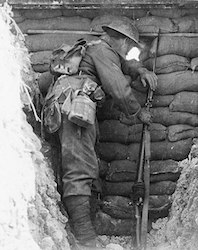
Bach and the Sentry
Watching the dark my spirit rose in flood
On that most dearest Prelude of my delight.
The low-lying mist lifted its hood,
The October stars showed nobly in clear night.
When I return, and to real music-making,
And play that Prelude, how will it happen then?
Shall I feel as I felt, a sentry hardly waking,
With a dull sense of No Man's Land again?
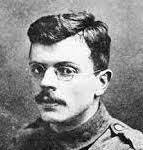
Ivor Gurney
1890-1937
0 notes
Text
Немного поэзии и цветов
Айвор Герни | Ivor Gurney (1890-1937)
Судьба Айвора Герни примечательна даже на фоне других судеб воевавших поэтов. Уроженец Глостера, он с детства увлекался музыкой; война прервала его учёбу в Королевском музыкальном колледже. С февраля 1915 года он служит во Франции, открывает в себе склонность к поэзии; в апреле 1917-го Герни был ранен в плечо, а в сентябре того же года отравлен газами и списан в запас.
Два первых сборника стихотворений «Северн и Сомма» (1917) и «Пожарища войны» (1919) не имели успеха. Герни возобновил учёбу, но в его карьеру вмешалась душевная болезнь, дававшая о себе знать ещё в юности, но обострившаяся по возвращении с войны. По настоянию семьи в 1922 году он был объявлен умалишённым и до конца жизни пребывал в разных лечебницах, впрочем, не прерывая творческой работы. Герни оставил огромное рукописное наследие, большая часть которого до сих пор не издана.
Ранние военные стихи Герни вполне традиционны, но постепенно он пришёл к характерному стилю: прозаичной и будничной лексике, сложным ритмам, балансирующим на грани свободного стиха, диссонансам вместо чётких рифм. Своеобразный ехидный пессимизм, горькая насмешка над поэтическими штампами и красивостями, над неприглядным военным бытом и заслоняющей жестокую реальность официальной риторикой — главные черты поэзии Герни.
Непонятый при жизни и заново открываемый буквально на глазах (самая недавняя крупная публикация его остававшихся в рукописи стихотворений относится к 2013 году), Герни, вполне возможно, — самый неклассический и «современный» британский поэт Первой мировой.
The songs I had are withered
Or vanished clean,
Yet there are bright tracks
Where I have been,
And there grow flowers
For other's delight.
Think well, O singer,
Soon comes night.
Чудесные цветы в акварели от современной канадской художницы Марни Вард.


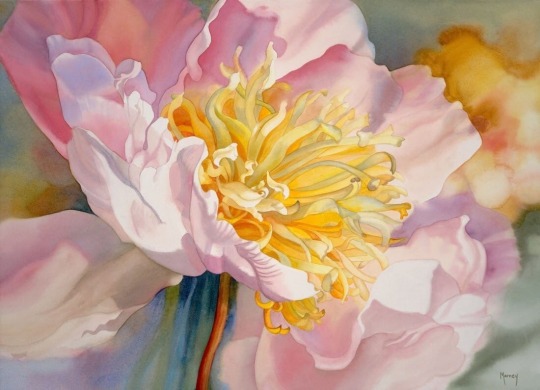

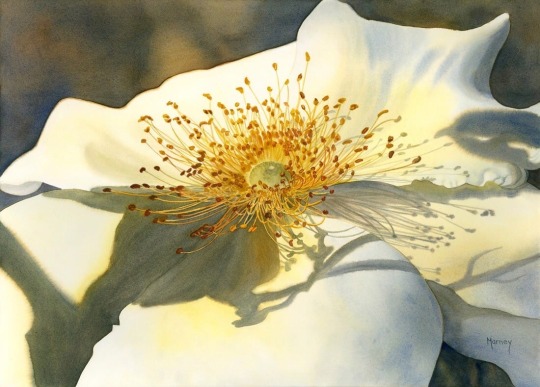

17 notes
·
View notes
Text
Poem of the Day 8 December 2020
After-Glow | BY IVOR GURNEY
(To F. W. Harvey)
Out of the smoke and dust of the little room
With tea-talk loud and laughter of happy boys,
I passed into the dusk. Suddenly the noise
Ceased with a shock, left me alone in the gloom,
To wonder at the miracle hanging high
Tangled in twigs, the silver crescent clear.
Time passed from mind. Time died; and then we were
Once more at home together, you and I.
The elms with arms of love wrapped us in shade
Who watched the ecstatic west with one desire,
One soul uprapt; and still another fire
Consumed us, and our joy yet greater made:
That Bach should sing for us, mix us in one
The joy of firelight and the sunken sun.
1 note
·
View note
Text
The Songs I Had
The songs I had are withered
Or vanished clean,
Yet there are bright tracks
Where I have been,
And there grow flowers
For others' delight.
Think well, O singer,
Soon comes night.
“The Songs I Had” by Ivor Gurney. Published in Selected Poems, edited by George Walter, J. M. Dent, 1996. This poem appears in one of Gurney’s notebooks between 1921 and 1922 and was not published during his lifetime.
1 note
·
View note